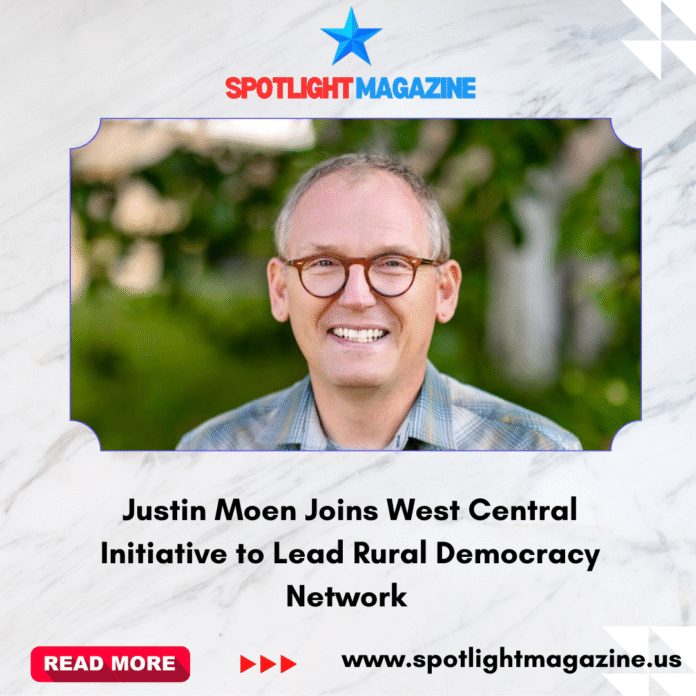Justin Moen has been appointed as the new coordinator of the Rural Democracy Network at West Central Initiative, where he will work to strengthen civic engagement and help rural Minnesotans shape the future of their communities. His new role will focus on creating opportunities for residents to participate in local decision-making, fostering collaboration, and ensuring rural voices are heard.
Moen moved to Otter Tail County in 2023 and quickly became active in community life. By the following year, he began working with the United Way of Otter Tail and Wadena Counties, supporting local initiatives and programs. His background includes more than ten years of experience in civics education, having taught at the University of South Dakota, the University of Georgia, and the University of Kansas. These roles gave him a strong foundation in teaching people about civic processes, leadership, and how communities can work together to solve challenges.
Beyond academia, Moen has long been passionate about community organizing. He has led efforts across Minnesota and South Dakota to bring people together, strengthen community ties, and inspire greater participation in local affairs. His work demonstrates a commitment to ensuring that rural communities are not only supported but empowered to create their own solutions. He has also shown his entrepreneurial side by helping to establish a successful business in downtown Fargo, proving his belief that thriving communities are built through both economic growth and civic involvement.
West Central Initiative sees Moen as a valuable addition to its team. Director of Civic Partnerships Ben Schierer said the organization is excited to welcome him, noting that he brings a wealth of practical knowledge about local government and a deep passion for rural communities. Schierer explained that Moen’s skills will help provide communities with the resources and tools they need to succeed, while also ensuring residents have meaningful ways to participate in shaping policies and decisions.
As coordinator of the Rural Democracy Network, Moen will lead efforts to expand civic engagement in the region. He will host workshops, organize forums, and build partnerships with local leaders and organizations. The goal is to encourage grassroots leadership and civic action, helping residents feel more connected and more confident in making their voices count. Through this work, the Rural Democracy Network hopes to foster stronger, more resilient communities where collaboration leads to positive change.
Moen expressed gratitude for the opportunity to take on this role, emphasizing his admiration for West Central Initiative’s commitment to supporting community-led solutions. He described their mission as one that keeps Greater Minnesota a place where neighbors thrive together, innovation flourishes, and the everyday lives of rural residents are valued and celebrated. His words reflect a deep appreciation for the importance of community in shaping both identity and future opportunities.
Originally from Moorhead, Minnesota, Moen has always maintained strong ties to the region. In addition to his professional work, he remains active in community organizations, including the Ottertail Lions, and serves on The Great American Think-Off Panel. Away from his civic duties, he enjoys spending time with his partner, working on projects around the house, mowing, tinkering, and enjoying life at the lake. His personal interests mirror his professional philosophy—that community thrives when people take time to connect with each other and their surroundings.
With his leadership, the Rural Democracy Network is expected to continue growing as a platform where rural residents can engage with one another, share their perspectives, and create meaningful change. Moen’s mix of academic experience, community organizing, and personal passion for rural life makes him well-suited to guide this effort. His work will not only support local democracy but also reinforce the idea that when people come together, they can build stronger, more connected communities across rural Minnesota.


